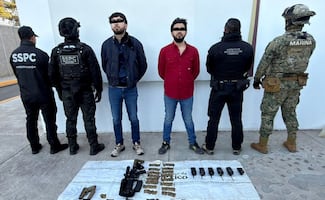Más Información

Cae Israel Vizcarra Beltrán, "El Palillo", jefe de plaza en "El Dorado"; es señalado de producir drogas para "Los Mayitos"

OCESA responde al Army mexicano; niega fraude y colusión con revendedores en la venta de boletos de BTS: "no hay forma"

Caen tres presuntos implicados en masacre de Salamanca; son detenidos en zona de influencia del Cártel de Santa Rosa de Lima

Dos detenidos y presunto exceso de velocidad, lo que sabemos del descarrilamiento del Tren Interoceánico; se cumple un mes

Gobierno de EU se dirige a otro cierre parcial tras tiroteo en Minnesota; demócratas no apoyarían presupuesto para Seguridad
Government surveillance requests are gathering pace in Mexico, raising concerns about lack of oversight in a country plagued by corruption and collusion between security forces and criminal gangs.
Last year, Mexican mobile operators fielded more than 55,000 requests from authorities for information on citizens' calls, messages, and location data, nearly 25 percent higher than in 2013, according to industry figures obtained by Reuters.
Mexico's government has been mired in a decade-long war against drug cartels and has used surveillance to fight their trafficking, extortion and kidnapping operations.
However, corruption is a daily battle in Mexico. Mobile phone companies and privacy activists worry the system is full of holes and that a new telecoms law risks giving the wrong people the right to ask for sensitive personal information.
"There's no real control of who can request it," said Fernando Belaunzarán, a politician running for leader of the center-left Party of the Democratic Revolution (PRD). "You've got corruption, and the police are infiltrated by organized crime ... Just who is getting their hands on this information?"
Edward Snowden's leak of U.S. National Security Agency documents in 2013 stoked debate about surveillance globally, and particularly how much power governments should have to snoop on their citizens and how they should be held accountable.
President Enrique Peña Nieto has described corruption as a cultural problem in Mexico, and the jailbreak of notorious drug lord Joaquín "El Chapo" Guzmán in July highlighted the problem of collusion with crime bosses. Prison officials and members of Mexico's intelligence agency Cisen have been charged over the escape.
Mexican federal and state agencies also spent more on eavesdropping software from Italian company Hacking Team than any other country last year, documents leaked online show.
Hacking Team's main product enables governments to bypass encryption to snoop on targets.
The industry figures will be published in an annual report by Consejo Ciudadano in Mexico City, a citizens' safety group, and industry body Anatel, which represents telecom firms América Móvil, Telefónica SA and AT&T Inc..
They reported a 12 percent rise in 2013. A request can contain multiple phone numbers.
LACK OF OVERSIGHT
U.S. and Brazilian laws require court approval for access to more kinds of private data than Mexico does. Only 3 percent of Mexico requests last year were reviewed by a judge, according to federal court data, while approval of the rest was left to mobile companies.
"Nobody watches the watchman," said Juan Pablo Adame, a former congressman in the conservative opposition National Action Party (PAN), who backs more controls on surveillance.
Telephone companies can be punished by the regulator for not handing over information, leaving them little incentive to fight costly battles over the matter.
People are not notified after the government snoops on them, nor can they find out, making it almost impossible to bring a case to court.
Oversight could be strengthened with a new national criminal procedure code, which specifies that prosecutors need judge approval for metadata, but it is yet to be fully implemented.
In the United States, the government reports how many people were arrested and convicted as a result of wiretaps used in criminal investigations. In Mexico, no such report exists.
Peña Nieto's government declined to answer specific questions about surveillance policies.
"The president's office has no comment on this issue, among other reasons because, supposing that your data are corroborated and the inferences correct, this is a national security issue," spokesman Paulo Carreño said in response to questions.
The attorney general's office did not respond to questions about why the number of requests has risen although the deputy attorney general for human rights, Eber Betanzos, said the government conducts surveillance responsibly and within the law.
Cisen said surveillance findings are classified and the Federal Police declined to comment.
WORRIES OVER NEW TELECOMS LAW
The telecommunications reform passed last year could make it even easier for the government to snoop, critics say.
Telefónica, AT&T's Nextel, and América Móvil, complained to the regulator that the law is too vague on which officials are allowed to ask for call, message and location data.
"The number of authorities that can ask for information should be limited, for security and legal certainty," Telefónica said in a public consultation posted on the regulator's website.
AT&T said it complies with the government when requests are made in accordance with the law.
Since the new law, América Móvil - which has around 70 percent of Mexico's mobile market - has received information requests from authorities that had never previously asked, spokeswoman Paula García said.
They include Mexico's national electoral institute (INE) and the finance ministry's financial crimes investigation unit (UIF), she said. Neither INE or UIF responded to requests for comment.
Mexico's telecoms regulator, the Federal Telecommunications Institute (IFT) is set to publish the security bylaws soon, after nearly a year of debate.
Paulina Martínez, general counsel for the IFT, said that the new legislation did not broaden surveillance powers.
Javier Lozano, a PAN senator who helped draft the law, agreed, though he stressed that a range of officials need the ability to eavesdrop.
"I see how organized crime wins the battle against the Mexican state because they're better organized than we are," he said.
Noticias según tus intereses
[Publicidad]
[Publicidad]









